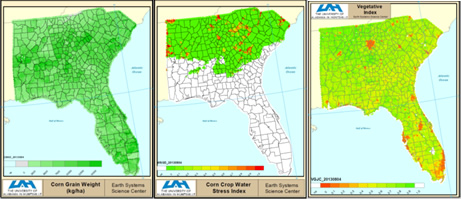
Richard McNider, mathematician and environmental scientist at the University of Alabama in Huntsville, will present "Water and Drought Issues Impacting and Facing U.S. Agriculture" at 10 a.m., Aug. 15 in 901 Hardin Hall.
McNider is a distinguished professor of science and a fellow of the American Meteorological Society.
In the last century, there was a major shift in agricultural production in the United States due to water and climate. Western irrigated agriculture grew while traditional rain-fed agricultural regions in the East declined. Grain production migrated from the Southeast to become concentrated in the upper Midwest. While market efficient, these shifts did not always account for environmental externalities or sustainability.
McNIder's presentation reports on an ongoing NSF-USDA funded study to examine whether a return of agriculture to the east under an irrigated assisted system is an important adaptation to climate change and climate variability. It looks at the tools needed to determine the viability and sustainability of expanded irrigated production in the Southeast. These include gridded crop models coupled with hydrologic models to determine irrigation demands and impacts on stream flows under historical scenarios.
Additionally, new NASA supported tools such as real-time crop models at high resolution driven by satellite derived insolation, land use dependent temperatures and radar derived precipitation are presented to assess real-time drought stress.
McNider is a mathematician/atmospheric scientist. His original degree was in mathematics from the University of Alabama. He studied oceanography and meteorology at Florida State University where he earned a Master of Science degree and completed his doctorate in environmental science at the University of Virginia in 1981. He joined the math department at the University of Alabama in Huntsville in 1983 and progressed to full professor in 1994. He has concentrated on the use of satellite data in mesoscale and air quality modeling.
Through his work in mathematics he embraced the use of nonlinear dynamics to study the stable boundary layer and its response to climate change. He founded the Earth System Science Center at UAH, one of its largest research centers, and served as Alabama state climatologist from 1982-1994. He has served as dean of the College of Science and executive director of the National Space Science and Technology Center.
McNider's visit is sponsored by the National Drought Mitigation Center and the Center for Advanced Land Management Information Technologies, both at UNL's School of Natural Resources.